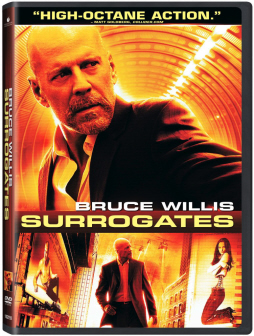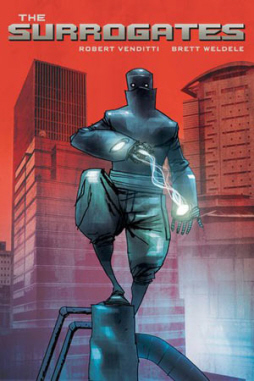Die Hard With Avatars: A review of Surrogates
 Early on in this film we see Bruce Willis with hair and looking young, and not Die-Hard bashed up, and we wonder absently if this time he’ll actually finish the film as scar-free as he began it. The Willis we begin with is quickly established as a ‘surrogate,’ the robot avatar of the real Willis character, Tom Greer, and it doesn’t take long for both Greer and his surrogate to get bashed up in familiar form.
Early on in this film we see Bruce Willis with hair and looking young, and not Die-Hard bashed up, and we wonder absently if this time he’ll actually finish the film as scar-free as he began it. The Willis we begin with is quickly established as a ‘surrogate,’ the robot avatar of the real Willis character, Tom Greer, and it doesn’t take long for both Greer and his surrogate to get bashed up in familiar form.
The problem for the inhabitants of near-future Boston — as well as of the rest of the world — is that mind-boggling economies of production have resulted in custom made, universally affordable, avatars brought to market for just about anyone who wants one, and now real people are vegetating alone in their homes while vicariously carrying on social interaction with each other through their surrogates.
The two inventors have had a falling out as to how much of a good thing surrogates really are. The ousted partner, Lionel Canter (James Cromwell) has decided they are robbing humankind of their humanity and has taken steps to sink the business.
He can do this because he (and he thinks, he alone) can enter and take control of anyone’s surrogate to bring down the system that powers the surrogates. His former partner, Strickland (Jack Noseworthy) intends to prevent this by having him murdered.
 Within this population of humans-with-surrogates is a smaller population who choose not to have surrogates and who live in areas where they’re prohibited. Strickland sends one of these surrogate-less humans, with a mysterious weapon, to carry out the contract.
Within this population of humans-with-surrogates is a smaller population who choose not to have surrogates and who live in areas where they’re prohibited. Strickland sends one of these surrogate-less humans, with a mysterious weapon, to carry out the contract.
When Canter’s surrogate son is mistakenly murdered, FBI Agent Greer sends his own surrogate to investigate. Murder of either surrogates or humans is relatively rare, and Greer and his FBI partner Jennifer Peters (Radha Mitchell) soon discover that whatever killed Canter’s surrogate son has also, mysteriously, killed Canter’s human son.
Greer’s own surrogate becomes a casualty of the chase and Greer himself elects to keep going without a surrogate, necessitating that he actually get out in the world.
Doing so gets him sufficiently beaten up that we begin to believe we may be watching Die Hard With Avatars. However, the experience brings Greer to thinking, as does Canter, that surrogates are more of a problem than a solution.
The chase becomes more complex when Greer encounters a human programmer, Bobby (Devin Ratray), who has figured out Canter’s secret for hijacking surrogates, and together they chase after Canter as he hijacks identities to escape his pursuers.
When Greer finally tracks down the human Canter, Canter reveals the real scope of his solution to the surrogate problem, a solution Greer and Bobby quickly conclude they must try to stop.
 The screenplay, based on Robert Vendetti and Brett Weldele’s 2005/2006 graphic novel, holds together pretty well although one must be prepared to set aside a fair amount of logic. Human nature, being what it is, would suggest that criminal activity in this future world would increase, rather than decrease, with avatars taking all the risks of lawbreaking.
The screenplay, based on Robert Vendetti and Brett Weldele’s 2005/2006 graphic novel, holds together pretty well although one must be prepared to set aside a fair amount of logic. Human nature, being what it is, would suggest that criminal activity in this future world would increase, rather than decrease, with avatars taking all the risks of lawbreaking.
Considering the legions of the sexually under-fulfilled out there in the world, one might expect that they would be sending their avatars out to cruise in force, rather than the opposite. Even if they were having sex, virtual sex isn’t going to maintain the population, and this world of the near future would seem to be self-extinguishing in a few generations as the surrogates’ human controllers die off alone.
These flaws aside, the film’s cautionary message seems to be that humankind must be vigilant against technology that compromises what makes us truly human. Two stars for the logic, three stars for the screenplay, four stars for the action – three and a half stars overall.
Surrogates is a refreshingly fluid science fiction film, the limitations of which mainly crop up while thinking about it after it’s over, rather than while viewing it.
George R. Morgan has been a fan of Science Fiction and SF art since 1952. A renowned collector, he’s built a complete run of all major and most minor U.S. science fiction magazines since 1926.